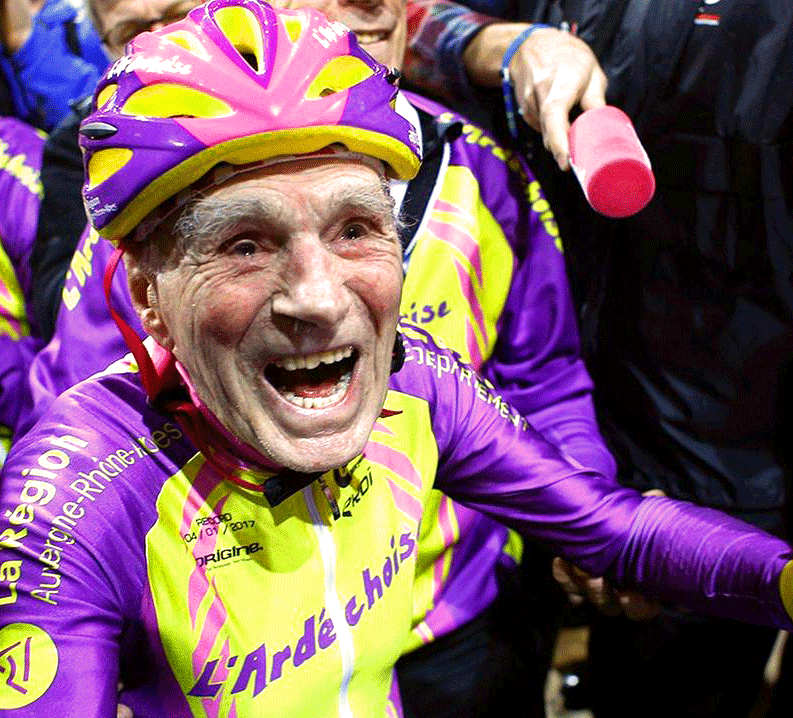08 Feb Can you actually get stronger as you age?

Robert Marchand, 105, sets new world bicycling record.
The French not only know how to live. Some of them are world-class at aging, both gracefully and vigorously.
On January 5, 2017 Robert Marchand, at the amazing age of 105 set a new world record and demonstrated something even more amazing. As if that were possible. He proved that you can actually improve exercise performance as you age.
This is startling because we’ve all been told, and have indeed experienced, how age slows us down, robs us of muscle, stamina and speed. But it appears that under certain circumstances, and with the right kind of training, the effects of age can be forestalled and even overturned, at least temporarily.
Marchand, after setting the one-hour record when he was 101 underwent a series of tests by Veronique Billat and her exercise science colleagues at the University of Evry-Val d’Essonne in France. Their tests created a benchmark against which they could measure subsequent performances. The results of these fascinating tests and subsequent follow-up were published as Case Studies in Physiology: Maximal Oxygen Consumption and Performance in a Centenarian Cyclist in The Journal of Applied Physiology. Clicking will link you to the abstract. If you are a fitness nerd (like me) you can access the full report via Google Scholar.
So Marchand sets a world record at 101 and then at the age of 103, just two years later, he set another world hour record, averaging 17 miles per hour, a performance improvement of 11 percent.
For those two years he trained 5,000 km per year (about 3,100 miles). About 80 percent of his riding was done at what was referred to as a “light” effort, a 12 on a scale of 1-20 with 20 representing an all-out effort. The rest of the time he trained at a considerably more vigorous pace, a 15 on the same perceived exertion scale. His cadence was measured at a rate of 50 to 70 revolutions per minute.
Over this period his body mass did not change, i.e. he did not gain weight or add muscle yet his VO2max increased by 13 percent. This is a fitness measure commonly thought to steadily decline after the age of 50. Peak power output also increased from 90 to 125 watts, an increase of around 39 percent. This was attributed not so much to his ability to pedal harder but to an increase in maximal pedaling frequency, which he boosted to a range of 69 to 90.
His maximal heart rate of 137 also did not change, which by most theories on aging should have declined. It remained steady while maximal ventilation increased from 57 to 70 liters per minute, an increase of 23 percent. Respiratory frequency increased 8 percent. So it appears the increased amount of intense exercise allowed him to consistently take in more oxygen and at a higher rate.
The scientists were as amazed as anyone to see that it was possible for someone so old to increase performance and VO2max simply by changing training protocol to include higher intensity work.
And for his record on January 5, at the age of 105 he managed to pedal at a pace of 14 miles per hour. I’ve been riding for years and there are many days when I would have been happy to have averaged 14 miles an hour.
After his world record he said he was disappointed with his time and feels that with a little more training he could do better. Spoken with the spirit of a true athlete.
Looking at the photos of him on the track I think one thing that could help is to have a major cycling brand sponsor his effort and get him an actual time trial bike along with some more aerodynamic gear like helmet, etc.
Maybe Marchand is truly a once in a generation phenomenon. But maybe not. There are a number of older, very talented athletes pushing age and performance barriers every year. Marchand may be just the beginning of a new era of human endurance and performance.

No Comments